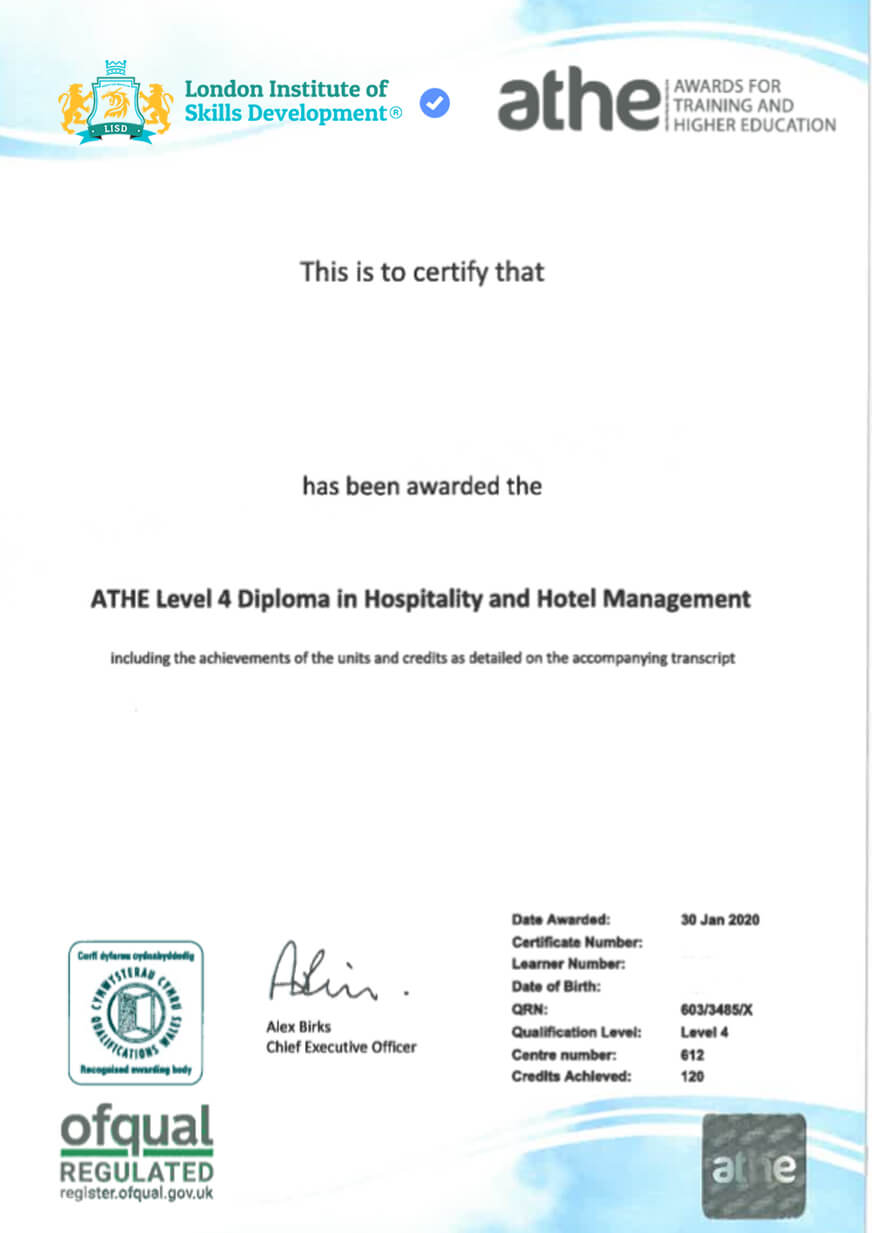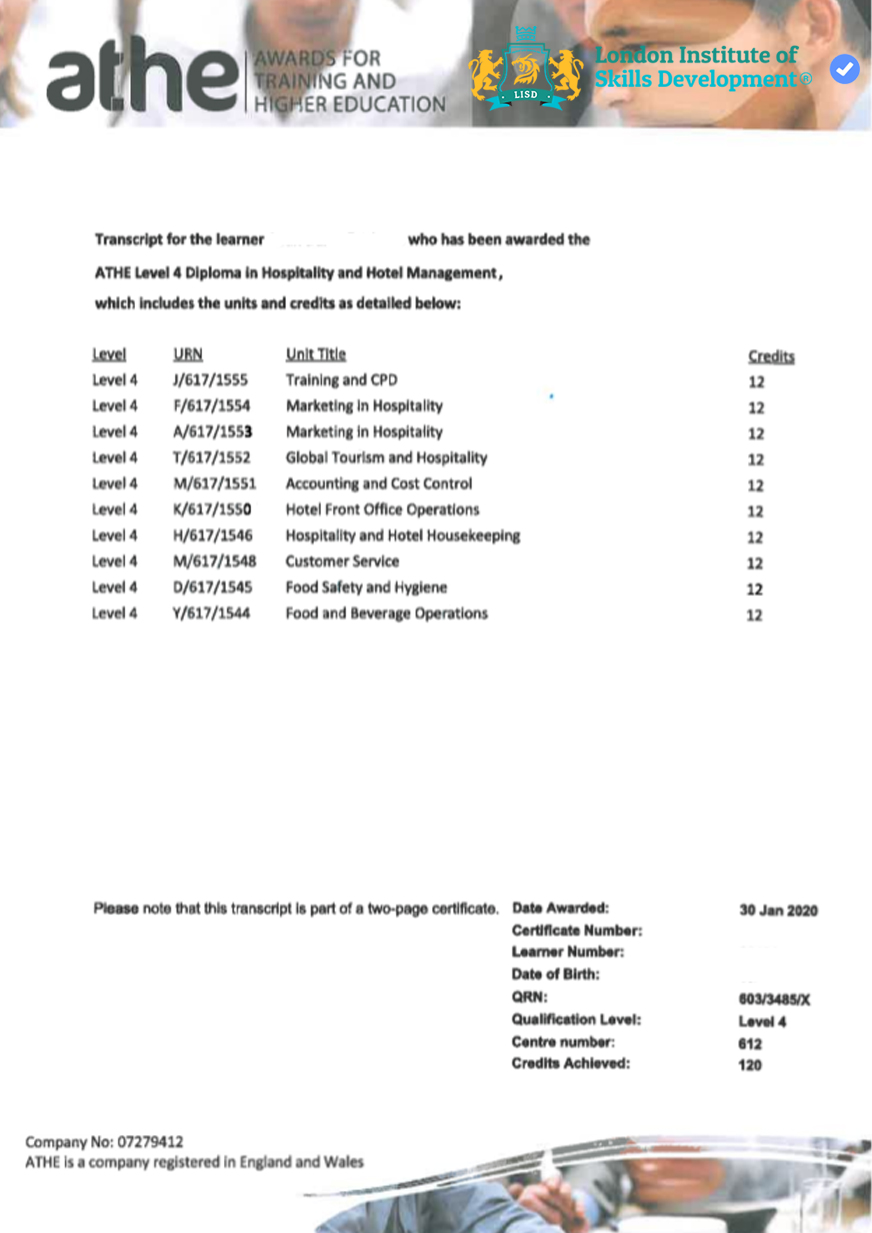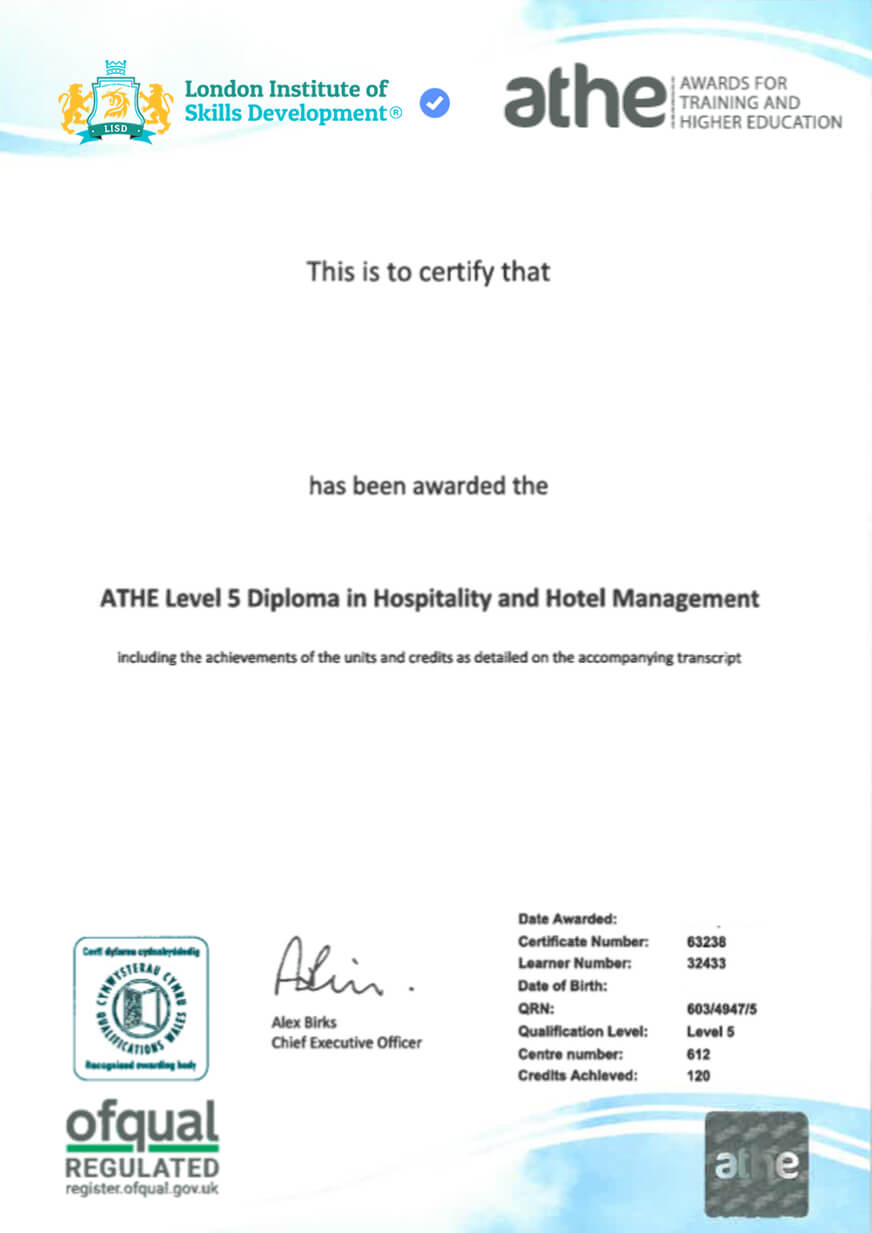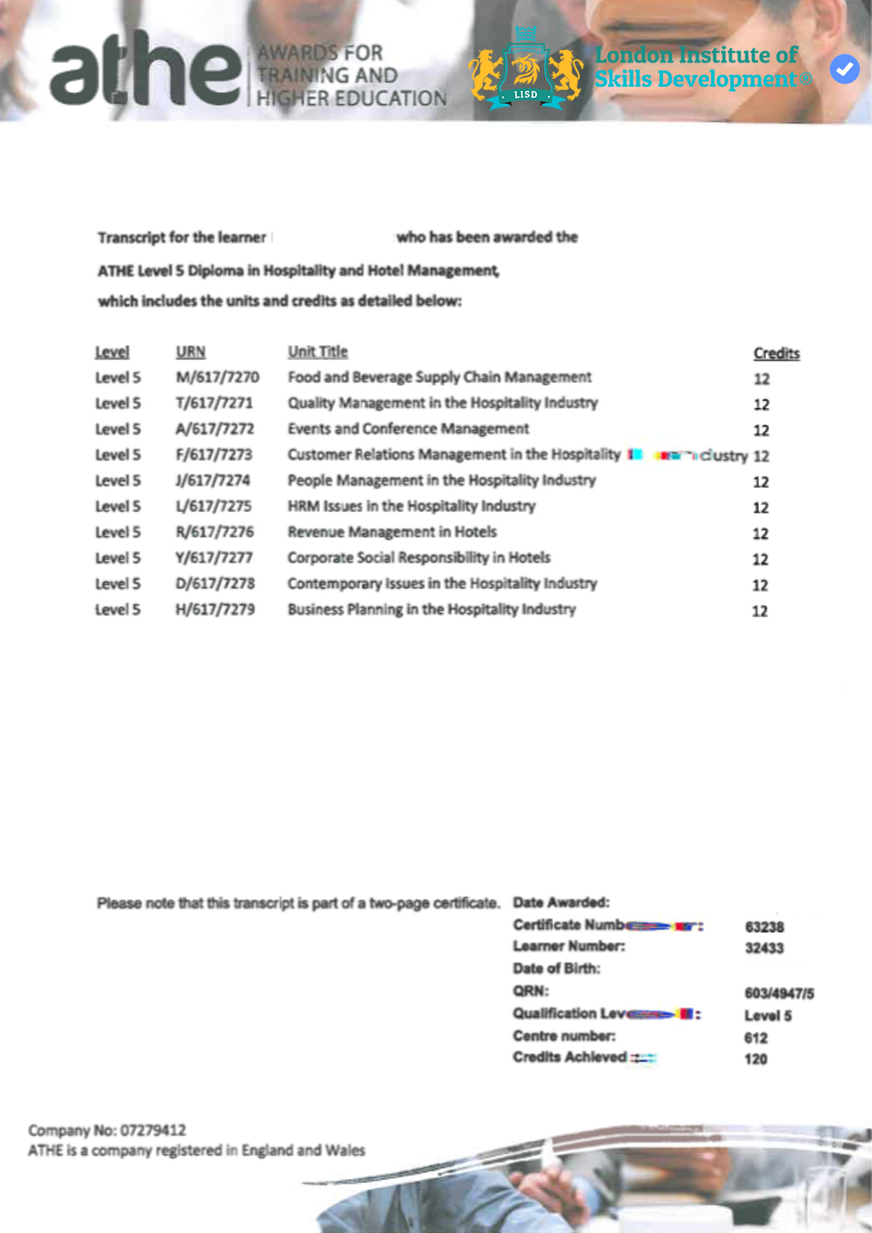Level 4 & 5 Diploma in Hotel & Hospitality
£ 2500 per level or £ 4500 for two levels together
Progress onto University final Year
Course Details
The fee for enrolling in the level 4 and level 5 courses together is £ 4500. Alternatively, students can enroll onto a single level (level 4 or 5) for £ 2500 each.
Students can make payment using one of the following methods:
- Credit or debit card
- Interest-free monthly installments
- Paypal
- Western Union
- All course material, including online modules and written assignments
- Personal tutor support with 1-2-1 Skype sessions
- Dedicated student support
- Access to an online social learning forum
- Assignment marking and feedback
- Free CV writing help on completion of the course
- Recommendation letter to employers
- FREE English language course (No IELTS required)
On completion of this course, students have the opportunity to complete the third year of a degree programme (BA Top-up) from a range of UK universities. The Top-up programme can be studied online or on campus.
Students can apply to any university offering the BA Top-up, listed below some universities that offer the BA Top-up programme in Hotel and Hospitality:
University Of Derby
- International Hospitality Business Management (Top-Up)
Bournemouth University
- BA (Hons) International Hospitality & Tourism Management
University Of Central Lancashire
- Management in Hospitality BA – Top-up
University Of Sunderland
- International Tourism and Hospitality Management (Top-Up) BSc (Hons)
University Of Northampton
- International Tourism Management (Top-Up) BA
To enroll in a Level 4 course, you must be at least 18 and have a full secondary education. Before enrolling in level 5, you must complete level 4.
Food And Beverage Operations
Students will gain an understanding of the processes involved in food and beverage operations, including practical aspects of food and beverage production and service.
Food Safety And Hygiene
Students will understand the need to comply with regulations and effectively manage procedures for ensuring food safety.
Hospitality And Hotel Housekeeping
Students will understand the role of the housekeeping department within a hospitality setting. This unit will identify the importance of the housekeeping department and the impact it has on the hospitality operation.
Customer Service
Students will be able to understand the importance of a customer-focused hospitality establishment in a competitive environment by carrying out research on customers’ requirements and expectations. Students will also gain skills to deliver excellent customer service and evaluate the benefits of exceeding customers’ expectations.
Front Office Operations
Students will understand the role of the front office department within a hospitality setting. This unit will identify the importance of the front office department and the impact it has on the overall hospitality operation.
Accounting And Cost Control
Students will understand the principles of costing within the hospitality and the contents of key financial statements used, along with the basic accounting techniques used to produce and analyze them.
Global Tourism And Hospitality
Students will understand the size and scope of the global tourism and hospitality industry. The unit examines the influences that affect it and the growth of its brands within international markets.
Marketing
Students will be able to understand the key principles of the marketing concept and relate the role of the marketing mix to the hospitality industry. Students will understand the marketing cycle and be able to devise a promotional campaign.
Employee Engagement
Students will understand the concept of employee engagement and key components. Students will be able to assess how employee engagement can have an impact on overall business performance by introducing specific strategies and practices.
Training And CPD
Students will be able to use different methods for identifying the need for training in a hospitality setting. Students will understand how individuals learn in different ways and the importance of selecting the most effective training method. Students will then be able to plan, design, deliver, and evaluate the effectiveness of a training session or program. The students will also be introduced to the concept of Continuous Professional Development and the need and relevance for it in a hospitality setting.
Food And Beverage Supply Chain Management
Students will understand supply chain systems and procedures, and how organizations use these to procure, produce and prepare food and beverages within the hospitality industry, both domestically and globally. This unit demonstrates how supply chain management is essential for efficient operation and for achieving a competitive edge.
Quality Management
Students will be able to understand the concept of quality and quality management and apply it in a hospitality setting. Students will be able to analyze, evaluate, and implement a quality management system in a hospitality organization.
Events And Conference Management
Students will understand the operational issues that underpin successful events and conference management. This unit examines a wide range of events and discusses the processes and considerations involved.
Customer Relations Management
Students will understand the importance of Customer Relationship Management (CRM) to hospitality organizations and recognize the necessary processes to ensure its effectiveness.
Managing People
Students are able to gain an understanding of the key principles of management behavior and a range of management styles, roles, responsibilities, characteristics, and skills. Students will be able to understand the effectiveness of different organization structures by studying the design and culture within a hospitality setting.
Current Issues In HRM
Students will be able to understand the key principles of Human Resource Management (HRM) and the current issues Human Resource (HR) managers have to consider when carrying out their roles and responsibilities. Students will also understand how current legislation has an impact on the HR function in Hotel and Hospitality Management.
Revenue Management
Students will be able to understand what the key elements of revenue management are and how this affects the pricing of hotel bedrooms. Students will also be able to implement the practices of yield management in a hotel and set an overbooking policy.
Corporate Social Responsibility
Students will be able to understand the key principles of Corporate Social Responsibility (CSR) and sustainable development. Students will learn about the impact hotels have on social, cultural, and environmental factors and how the hotel industry can make a difference by implementing practices and procedures to be more sustainable.
Contemporary Issues
Students will understand the nature and impact of current and potential Contemporary issues that affect the hospitality industry. This unit will demonstrate the need for organizations to be flexible and to adapt to rapidly changing environments and customer demands.
Business Planning
Students will understand how to create a business plan for a hotel or hospitality organization. Students will learn where the business is positioned in the current market, measure the performance, and suggest opportunities for growth.
The ATHE Level 4/5 Hotel and Hospitality course is made up of 10 modules and 10 written assignments at each level. On completion of the modules, students will be given access to the assignments. The assignments are approximately 5,000-8,000 words each. Students are provided support on the modules and assignments via the ‘Tutor’ section of the learning platform.
The Assignment unit titles for the level 4 course are:
- Food and beverage operations
- Food safety and hygiene
- Hospitality and hotel house keeping
- Customer service
- Front office operations
- Global tourism and hospitality
- Employee engagement
- Marketing in hospitality
- Accounting and cost control
- Training and CPD
The Assignment unit titles for the level 5 course are:
- Food and beverage supply chain management
- Quality management
- Events and conference management
- Customer relationship management
- People management in the hospitality industry
- HRM issues in the hospitality industry
- Revenue management in hotels
- Corporate social responsibility
- Contemporary issues in the hospitality industry
- Business planning in the hospitality industry
During the course of study for their diploma in Hospitality Management, students will gain skills in food and beverage supply chain Management, accounting and cost control, marketing in Hotel and leisure, and more. Upon successful completion of the course, students can pursue positions at hotels, restaurants, resorts, and other associated properties in the Hotel and Hospitality industry.
For fee and scholarships contact research@londoninstitutesd.co.uk
About the course
Prepare for an exciting career in the hospitality industry through the online Hotel Management course.
Students on our online Hospitality Management program will undertake a Level 4/5 240-credit course, designed to prepare students with the skills needed to be a competent employee in the hospitality industry. During the Hotel Management program, students will have the ability to access tutor support and webinars, a social learning forum, and additional materials to help in the completion of their diploma. For more information on the support available to students, visit our Student Resources page.
Each module consists of 40 guided learning hours of material with an additional 30-50 hours worth of optional materials that comprise of recommended exercises, recommended readings, Internet resources, and self-testing exercises.
Upon passing the online assessments and written assignments, students will be awarded an ATHE diploma and will be able to top up to a bachelor’s degree.
Level 4 Sample Certificate


Level 5 Sample Certificate


